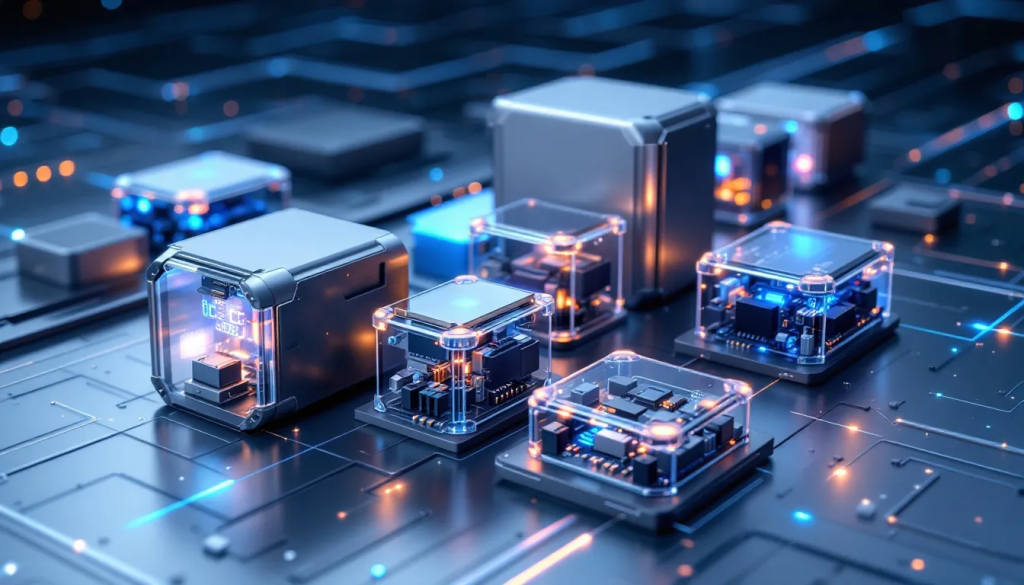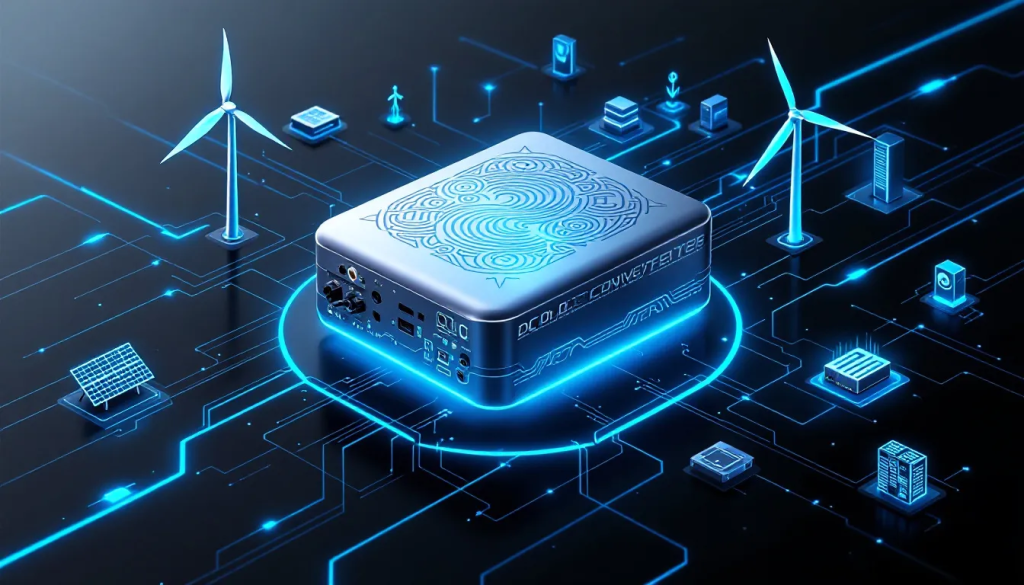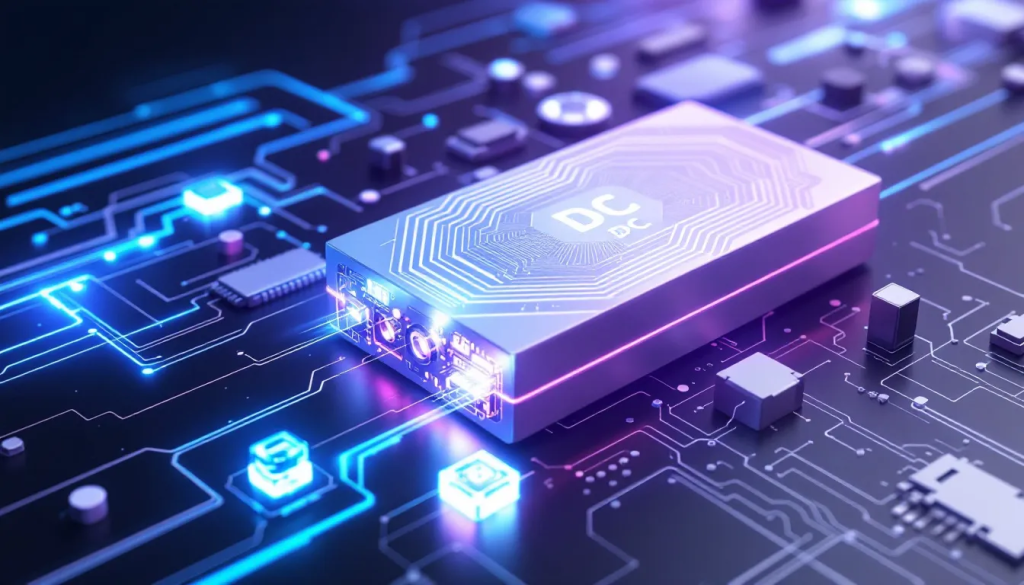- Key Takeaways
- Top DC-DC Converter Solutions for Your Power Needs
- Introduction
- Understanding DC/DC Converters
- Key Features of High-Performance DC/DC Converters
- The Role of Isolation in Power Conversion
- Applications of DC/DC Converters
- Selecting the Right DC/DC Converter
- Expert Support and Resources
- Summary
- Frequently Asked Questions
A DC/DC converter changes one DC voltage level to another, ensuring stable power for your devices. Choosing the right converter is crucial, whether it’s for industrial equipment or various other applications. This article covers the types, uses, and key features of DC/DC converters.
Key Takeaways
- DC/DC converters efficiently convert DC voltage levels, extending battery life in devices and reducing energy costs in industrial applications.
- Two main types of DC/DC converters exist: isolated converters provide safety through galvanic isolation, while non-isolated converters are cost-effective and compact.
- DC/DC converters are vital across various sectors including renewable energy, automotive, and industrial equipment, ensuring stable power management and operational efficiency.
Top DC-DC Converter Solutions for Your Power Needs

DC/DC converters are marvels of modern engineering, designed to convert one DC voltage level to another with unparalleled efficiency. This efficiency is not just a technical specification; it translates into real-world benefits such as prolonged battery life in various devices and reduced energy costs in industrial applications. Imagine your factory machines consuming less power while maintaining peak performance. These are the tangible advantages that efficient DC/DC converters bring to the table.
In battery-powered devices, DC/DC converters are indispensable, converting varying battery voltage levels to a stable output. This voltage regulation is crucial for the proper functioning of electronic components, preventing malfunctions and extending the lifespan of your devices.
Whether it’s a portable medical device, an electric vehicle, or even a simple flashlight, the role of DC/DC converters is pivotal in ensuring reliable and efficient power management.
Introduction
DC/DC converters are the unsung heroes of modern electronics, quietly ensuring that your devices operate smoothly and efficiently. These converters are essential components that convert one DC voltage level to another with high efficiency. This seemingly simple function is critical for effective power management, ensuring that your devices receive the right voltage levels to operate optimally.
From portable gadgets to large industrial systems, DC/DC converters are everywhere. They are commonly found in applications such as renewable energy systems, automotive electronics, industrial machinery, and more. These converters not only provide stable power but also play a crucial role in controlling noise, heat, and voltage fluctuations, making them indispensable in a variety of settings.
In the following sections, we will explore the different types of DC/DC converters, their key features, and the various applications they serve. We will also discuss how to select the right converter for your needs and the support resources available to help you make informed decisions. This guide will provide a comprehensive understanding of DC/DC converters and their significance in the modern world.
Understanding DC/DC Converters
At their core, DC/DC converters are power converters that facilitate the conversion of one DC voltage level to another with high efficiency. This ability to manage different voltage levels is what makes them crucial for effective power management in numerous applications. Whether you’re dealing with a small electronic gadget or a large industrial machine, the need for stable and precise voltage levels is universal.
One of the primary uses of DC/DC converters is in battery-powered devices. Batteries often provide a varying voltage output that can fluctuate significantly during use. DC/DC converters ensure this varying input is converted to a stable output voltage, ensuring the reliable operation of the device. Without these converters, our portable electronics would be far less reliable and efficient.
Key Features of High-Performance DC/DC Converters
High-performance DC/DC converters are engineered to maximise efficiency by minimising energy loss during voltage transformation. Advanced switching techniques are employed to reduce energy wasted as heat, resulting in a more efficient power supply that saves energy and lowers operational costs. In large-scale industrial applications, even small efficiency improvements can lead to significant cost savings. High-efficiency DC-DC converters can achieve efficiencies of up to 95%, making them highly effective in demanding applications.
These converters are designed to meet stringent standards for durability, scalability, and efficiency. They are celebrated for their high quality, robust design, and space-saving features.
The range of options includes both linear and switching modules, providing versatility to handle different voltage levels across a wide array of applications. This adaptability makes high-performance DC/DC converters invaluable in various sectors, from renewable energy generation to automotive and industrial equipment. They ensure stable output power and manage voltage fluctuations efficiently, meeting the diverse needs of modern electronic systems. By offering solutions that are both reliable and efficient, these converters play a crucial role in optimising power management and enhancing the overall performance of the systems in which they are integrated.
The Role of Isolation in Power Conversion
Differentiating between isolated and non-isolated DC/DC converters is essential. Non-isolated converters are simpler and more cost-effective but lack the safety features required for high-voltage applications. Isolated converters, on the other hand, provide galvanic isolation, making them suitable for more demanding and high-voltage applications. This distinction is crucial when selecting the right type of converter for your specific needs.
Isolated DC/DC Converters
Isolated DC/DC converters are designed to provide a high level of safety and reliability by incorporating galvanic isolation. This means there is no direct electrical connection between the input and output, achieved through the use of transformers or opto-isolators. This separation prevents electrical faults from propagating between circuits, which is particularly important in high-voltage or sensitive applications.
Isolated converters are ideal for use in environments where safety is paramount, such as in medical devices or industrial equipment that requires independent power systems. They help prevent electrical shock hazards and ensure that sensitive equipment operates without interference from external electrical noise. Additionally, isolated converters can offer cleaner power delivery, reducing electromagnetic interference (EMI) and improving overall system performance.
Non-isolated DC/DC Converters
Non-isolated DC/DC converters, in contrast, do not provide electrical separation between input and output. They are typically simpler in design, which makes them more compact and cost-effective. These converters are well-suited for applications where space and budget constraints are significant considerations, such as in consumer electronics and automotive systems.
Despite their lack of isolation, non-isolated converters are highly efficient and capable of providing excellent voltage regulation. They are commonly used in applications where the input and output share a common ground, such as in-vehicle systems where negative ground is standard. The absence of isolation components also allows for better efficiency and simpler circuit designs, making them an attractive option for many everyday applications.
In summary, choosing between isolated and non-isolated DC/DC converters depends on the specific requirements of your application. If safety and noise reduction are critical, isolated converters are the preferred choice. However, for applications where cost and space are priorities, non-isolated converters offer a practical and efficient solution.
Applications of DC/DC Converters

The versatility of DC/DC converters makes them invaluable across a range of applications. In the renewable energy sector, these converters are used to optimise power output from solar panels and wind turbines. They ensure that the harvested energy is converted efficiently to usable power, enhancing the overall performance of renewable energy systems.
In the automotive sector, DC/DC converters manage power distribution and improve energy efficiency, ensuring reliable energy usage.
Industrial applications are another significant area where these converters play a crucial role. From manufacturing to plant construction, DC/DC converters help maintain consistent voltage levels, ensuring the smooth operation of machinery and automation systems. Additionally, they are vital in navigation systems, providing a stable power supply during power failures on ships.
Renewable Energy Generation
When it comes to renewable energy generation, DC/DC converters are essential. They work their magic by optimising the energy gathered from solar panels, making sure the electricity produced is converted to the right voltage levels for different uses. This optimisation boosts the overall efficiency of solar energy systems, making them not just more effective but also more reliable.
Photovoltaic systems, in particular, benefit from the use of DC/DC converters, which ensure efficient conversion of solar energy into usable power. These converters enhance the performance of renewable energy applications by adjusting the voltage of the electricity generated, making them more viable and efficient.
Industrial Equipment
In industrial settings, DC/DC converters are crucial for powering automated guided vehicles and ensuring consistent voltage levels for automation systems. These converters help maintain operational efficiency, which is vital for the smooth functioning of industrial machinery.
The reliability and compact design of DC/DC converters make them a popular choice in industrial equipment, consumer electronics, and medical devices. By ensuring power efficiency and reliability, these converters play a pivotal role in maintaining the performance and longevity of various industrial systems.
Navigation Systems
In navigation systems, particularly in aerospace applications, DC/DC converters are essential for providing stable power to avionics. This stability is crucial for ensuring safety and reliability during flight, as any fluctuations in power supply can have significant consequences.
DC/DC converters help maintain voltage levels during power fluctuations, enhancing the reliability of navigation equipment. These converters stabilise power in avionics systems, ensuring that navigation systems operate smoothly and reliably, even in challenging conditions.
Selecting the Right DC/DC Converter

Selecting the right DC/DC converter involves considering several critical factors. The input voltage specifications must align with the power source to ensure compatibility. Additionally, the output power rating of the converter must match the requirements of the application to ensure optimal performance.
Efficiency ratings are another important consideration, as they help minimise energy waste and heat generation. Advanced thermal management systems in DC/DC converters can help maintain optimal performance and extend the lifespan of the device.
Finally, the compact design of many DC/DC converters allows for easy integration into space-constrained environments, making them suitable for a variety of applications.
Expert Support and Resources
Our team of experts is ready to assist you with all your DC/DC converter needs. We offer professional consultation and support during office hours to ensure you have the guidance necessary for selecting and utilising the right converters for your applications. Our knowledgeable staff can provide insights and recommendations tailored to your specific requirements. To get in touch with our experts contact us.
Summary
In summary, DC/DC converters are indispensable components in modern electronic systems, providing efficient voltage conversion and stable power supply across a variety of applications. From renewable energy systems to industrial machinery and navigation equipment, these converters ensure reliable and optimal performance.
Choosing the right DC/DC converter involves understanding the specific requirements of your application, including input voltage, output power, and efficiency ratings. With the right accessories and support resources, you can maximise the performance and longevity of your converters, ensuring that your devices operate smoothly and efficiently. By leveraging the expertise and resources available, you can make informed decisions and achieve the best results for your power management needs.
